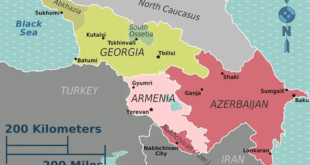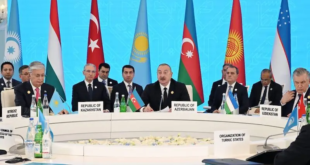Last week, Chechen rebel leader Dokka Umarov finally confirmed his decision to declare a Caucasian Emirate (Chechnya Weekly, November 1 and 8). His statement on the Emirate was posted on the Kavkaz-Center rebel website on November 21. Moreover, two days later, Kavkaz-Center posted two videos of Dokka Umarov in which he sharply criticized the Chechen rebels who had protested the declaration of the Caucasian Emirate.Umarov rejected any criticism of the idea to replace the Chechen Republic of Ichkeria with the Caucasian Emirate, and warned all Chechen rebels who live abroad not to cooperate with “infidels” or Western political leaders of the Western countries, or to negotiate with the Russian government behind Umarov’s back. Umarov particularly stressed that he was against all “infidel” laws or rules and that he rejected democracy as a system of governance because it was invented by non-Muslims. “Mujahideen in the Caucasus do not fight for democracy, they fight for Sharia,” the rebel leader said in his statement. Umarov also made it understood that another reason for declaring the Caucasian Emirate was that the rebel movement no longer restricted itself to the Chechen borders. Thousands of mujahideen of the multinational Caucasus have risen to take part in Jihad,” he said. “Our bases spread from Azerbaijan to Abkhazia.”Â
Umarov also said that he did not need any sanction from the Majlis-ul-Shura (the council of field commanders) or anybody else to declare the Emirate, because it was his duty as a Muslim to establish an Islamic state as required by Sharia.
Â
Umarov has divided the North Caucasus into vilayets (administrative areas in Arabic). That was what provinces were called during the Ottoman Empire, which existed from the 16th century until the end of World War I. According to the rebel leader, rebels should now call Dagestan the vilayet of Dagestan, Chechnya the vilayet of Nokhchicho, Ingushetia the vilayet of Khyalgaicho, Ossetia the vilayet of Iriston, Stavropol Krai the vilayet of the Nogai Steppe and Karachaevo-Cherkessia and Kabardino-Balkaria the unified vilayet of Balkaria, Kabarda, and Karachai. The Caucasian Emirate is to be ruled by the Supreme Amir (Dokka Umarov), who is the only source of power in this “state.”
Â
What forced Dokku Umarov to take such a radical step? Why is this Chechen field commander, who just a year ago met Western and even Russian journalists Andrei Babitsky in Chechnya, now saying that a Muslim should never have any dealings with infidels? Why does a leader who declared in his first statement as president of the Chechen Republic of Ichkeria (ChRI) that the main goal of the Chechen rebels was to force Russia to go back to the time of the peace agreement signed by Boris Yeltsin and Aslan Maskhadov in 1997 (Chechnya Weekly, November 28) now say that he rejects all infidel laws and names? Why does Dokka Umarov, who used to be known as a radical Chechen nationalist, say now that Ichkeria means nothing for him any more?
Â
The answer to these questions can also be found on the Kavkaz-Center’s website. Almost simultaneously with Umarov’s statements, the website posted an audio message and a declaration by Anzor Astemirov, the leader of rebels in Kabardino-Balkaria.
Â
In his long declaration, Astemirov explained why the Emirate was declared now. The KBR rebel leader revealed some details in his audio message about how the rebels prepared the establishment of the Emirate. The most interesting thing in what Astemirov had to say concerned his negotiations with the Chechen warlord Shamil Basaev in Nalchik, the capital of Kabardino-Balkaria, in 2005. According to Astemirov, Basaev met him and Ilyas Gorchkhanov, then the leader of the Ingush rebels. Astemirov and Gorchkhanov told Basaev that they wanted to create the Caucasian Front in the North-West Caucasus and to initiate a large-scale struggle against Russian rule in the region. At the same time, Basaev said that the Ingush and KBR rebels should give an oath of loyalty to Abdul-Khalim Sadulaev, then the leader of the Chechen rebels. Astemirov said that the negotiations were not easy, because Basaev demanded from Gorchkhanov and Astemirov that they cease any hostilities against the authorities if the Kremlin agreed to have peace talks with Sadulaev. Astemirov and Gorchkhanov insisted that they would agree to this only if Basaev promised them that the future independent Chechen state would be totally Islamic, without any of the attributes of an infidel governing structure, like a presidency or parliament, and would not have the word “republic” in its name. Basaev rejected these demands and said that if Astemirov and Gorchkhanov did not agree to give an oath of loyalty to Abdul-Khalim Sadulaev as the president of the Chechen Republic of Ichkeria they should not expect any assistance from Basaev and other Chechen rebel commanders. Astemirov and Geriskhanov ultimately agreed to Basaev’s demands.
Â
Astemirov said, however, that after the deaths of Sadulaev and then Basaev, he sent a letter to Dokka Umarov asking him what he thought about the idea of declaring an Emirate that would replace Ichkeria. Umarov agreed and appointed Astemirov head of the Caucasian insurgency’s Sharia Court instead of Mansur Yelmurzaev, a Chechen Islamic scholar who was against the Emirate idea and urged saving Ichkeria as a symbol of the Caucasian resistance.
Â
It looks as if Astemirov, following Basaev’s death, gave Umarov an ultimatum in an attempt to force him to “bury” Ichkeria and to declare the Emirate. Umarov, who needs the support of non-Chechen fighters in Kabardino-Balkaria, Ingushetia, and Dagestan, had no alternative but to agree.
Â
The declaration of the Caucasian Emirate clearly demonstrates the rising influence of non-Chechen rebel leaders inside the Caucasian insurgency. For non-Chechen fighters, Chechen independence means nothing, and they do not want to fight any longer under the Chechen flag. Indeed, from the very beginning, the Caucasian insurgency, unlike the Chechen rebel movement, showed more signs of being a radical Islamist movement than a nationalist one.
 Eurasia Press & News
Eurasia Press & News



